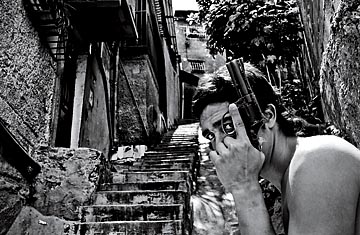
A gang member poses with a gun in Caracas. Some 50 homicides occur in the city each week.
(2 of 4)
Barrio Blues
Catia's more than 300,000 residents are among the best people I've known in Latin America: generous, hardworking and talented — evidenced by all the local kids who fill Venezuela's famed Simón Bolívar Youth Orchestra. They're hardly the niches, or uncouth rabble, the Caracas upper class calls them. And that makes their living conditions all the more tragic. If you arrive in Caracas at night, as I did in 1985, the lights of the city's vast hillside slums, known as los ranchos, shimmer like rough diamonds. Not so in the morning. When I arrived in Catia that year as a volunteer teacher, the community seemed consigned to the far side of the moon.
Shantytowns were the barrio's norm. For many families, a typical dinner was pasta and ketchup, and potable water was drawn in jugs at the bottom of steep, garbage-strewn streets. There were no decent public schools. Getting to grocery stores or clinics could mean two or three bus rides. Street noise often included gunfire, but some of the worst criminals were the police, like the drunken cop I remember who, while extorting money from residents, shot and killed an 8-year-old boy as the child flew a kite. The Catia prison, since demolished, was a Dantean hell where I saw boys who were arrested for petty theft sharing cells with men convicted of multiple murders. All the while, Venezuela's kleptocracy kept plundering the oil wealth, leaving more than half the population in inexcusable poverty.
It was no surprise, then, that cazerolazos, the beating of pots and pans, rang out in Catia in 1992, when Chávez, then an army officer, led a botched but bloody coup against President Carlos Andrés Pérez. People in the ranchos declared Chávez their hero, especially since he, like so many of them, hails from the central plains, where llaneros, or cowboys, are known for their defiance of authority.
The barrios catapulted Chávez to the presidency six years later. He set out to empower marginalized populations like Catia's via lavish social programs called misiones. At least one Caracas barrio now has cable cars ferrying residents to the city below, making jobs and other critical activities more accessible. On balance, Chávez has reduced Venezuela's poverty. I asked a supporter in Catia eight years ago if she thought el comandante was just using his misiones to buy votes. The woman replied, "No Venezuelan President before Hugo has ever even tried to buy my vote."
Yet if Chávez isn't quite a dictator in the Castro mold, he's become what critics call a "democratator" à la Russian President Vladimir Putin. He seems to believe that the practice of being elected democratically excuses him from an obligation to govern democratically. But it hasn't, not even in Catia. In fact, as Chávez has amassed more power — subordinating the legislative and judicial branches, nationalizing thousands of businesses and farms, eliminating presidential term limits, arbitrarily disqualifying hundreds of opposition candidates for office, enacting anti-defamation laws that chill free speech and forging gratuitous anti-U.S. alliances with global pariahs like Syria — his barrio base has weakened. He lost a 2007 referendum on expanding his socialist agenda largely because poorer voters stayed home; the opposition won the popular vote in the 2010 elections, but arcane rules denied it a majority of National Assembly seats.
And that has perhaps less to do with the revolution's authoritarian bent than with its retro creed. As Chávez described it to me in a 2006 interview, he believes "capitalism is the way of the devil and exploitation" and that "only socialism can really create a genuine society." More moderate leftist governments in South America, from Brazil to Uruguay to Peru, are developing with a third-way hybrid of capitalism and socialism. But Chávez's obsession with imitating his communist idol, Castro, has made Venezuela's economic situation increasingly dysfunctional — despite the oil-price bonanza of the past decade, average annual economic growth has been less than 3% — as Catia demonstrates.
